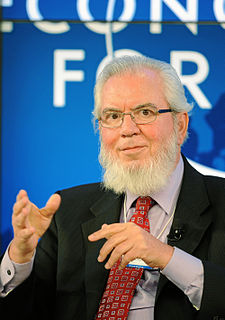A Quote by Julian Sanchez
[There is a] strong correlation between market freedom and lower government corruption -- not terribly surprising, since the effect of increasing regulatory power is to shift 'cheating' from the private to the public sphere.
Related Quotes
The bourgeois public sphere may be conceived above all as the sphere of private people come together as a public; they soon claimed the public sphere regulated from above against the public authorities themselves, to engage them in a debate over the general rules governing relations in the basically privatized but publicly relevant sphere of commodity exchange and social labor.
Many of those on the right distrust the Fed and want to eliminate its power in the belief that the private economy, including the private banks, will be much more efficient, productive and even democratic if they are left to themselves: in other words, the criticism of the Fed really reflects a desire to cripple the government in the service of increasing the power and authority of the market.
Privacy is dead. We live in a world of instantaneous, globalised gossip. The idea that there is a 'private' sphere and a 'public' sphere for world leaders, politicians or anyone in the public eye is slowly disintegrating. The death of privacy will have a profound effect on who our leaders will be in the future.
What do intellectuals and opinion makers get from big government? An increasing number of cushy jobs in the bureaucracy, or in the government-subsidized sector, staffing the welfare regulatory state, and apologizing for its policies, as well as propagandizing for them among the public. To put it bluntly, intellectuals, theorists, pundits, media elites, etc. get to live a life which they could not attain on the free market, but which they can gain at taxpayer expense.
Extrapolated, technology wants what life wants:
Increasing efficiency
Increasing opportunity
Increasing emergence
Increasing complexity
Increasing diversity
Increasing specialization
Increasing ubiquity
Increasing freedom
Increasing mutualism
Increasing beauty
Increasing sentience
Increasing structure
Increasing evolvability
A global financial cabal engineered a fraudulent housing and debt bubble [2008], illegally shifted vast amounts of capital out of the US; and used 'privatization' as a form of piracy - a pretext to move government assets to private investors at below-market prices and then shift private liabilities back to government at no cost to the private liability holder Clearly, there was a global financial coup d'etat underway.
Public virtue cannot exist in a nation without private, and public virtue is the only foundation of republics. There must be a positive passion for the public good, the public interest, honour, power and glory, established in the minds of the people, or there can be no republican government, nor any real liberty: and this public passion must be superiour to all private passions.
Now listen to the first three aims of the corporatist movement in Germany, Italy and France during the 1920s. These were developed by the people who went on to become part of the Fascist experience: (1) shift power directly to economic and social interest groups; (2) push entrepreneurial initiative in areas normally reserved for public bodies; (3) obliterate the boundaries between public and private interest -- that is, challenge the idea of the public interest. This sounds like the official program of most contemporary Western governments.
We in Germany could, for example, lower taxes. And who is against that? The Social Democrats.
We could also mobilize more private investments for public infrastructure projects liken the construction of highways. But the Social Democrats also reject this, even though they are at times similar to others abroad in their carping about the surplus. Incidentally, some of the consequences of the good economic situation are strong increases in wages, rising pensions and a strong labor market.






































